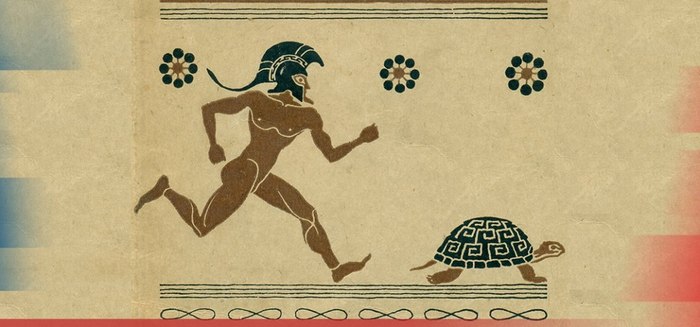
I had doubts about this post. On the one hand, the story seems to be widely known. On the other hand, I have repeatedly come across the fact that what is generally known for some turns out to be new information for others (this also applies to me). So, who knows, do not swear, again, schoolchildren can come in handy.
So, well-known fact number one . Mathematical analysis (a branch of mathematics at the origins of which were Leibniz and Newton) became one of the foundations of scientific progress in the 17th-18th centuries and the subsequent industrial revolution. Therefore, the value of the method of differential calculus for our civilization can hardly be overestimated.
Now imagine how the course of history would have changed if the same thing happened a couple of millennia earlier. And this is not a plot for the next opus about the "priest", ancient scientists several times came quite close to this discovery. Here is one such example.
In the 5th century BC, in the Greek colony of Elea (this is the western coast of Italy, 90 kilometers south of Naples) lived a philosopher known to us as Zeno of Elea .

He was not the only philosopher in those parts, there was a whole Elea school, whose participants were engaged in discussions about what is being and knowledge. Zeno also took part in these conversations, his written works did not reach us, but Aristotle's retelling of his aporias (outwardly paradoxical statements), to which Zeno was greedy, has survived. Simply put, he took a seemingly obvious problem, and then turned it inside out and it turned out that she did not seem to have a solution.
One of his most famous aporias is the story of Achilles and the tortoise, which can be called well-known fact number two. But, just in case, I will repeat it briefly. Zeno argued: the swift-footed Achilles, no matter how hard he tried, would never catch up with the unhurried turtle, if at the beginning of the movement the turtle was in front of Achilles.
“Let's say Achilles runs ten times faster than a turtle and is a thousand steps behind it. During the time it takes Achilles to run this distance, the turtle will crawl a hundred steps in the same direction. When Achilles runs a hundred steps, the turtle crawls another ten steps, and so on. The process will continue indefinitely, Achilles will never catch up with the turtle. "
It is clear that from the point of view of a real Achilles, it is not difficult to catch a turtle. But from the standpoint of pure mathematics, we have an infinite sum of small segments, and the analysis of infinitesimal, if you remember, is the historical name of mathematical analysis. That is, Zeno set the problem in such a way that it could be solved using mathematical analysis. The very situation that I spoke about - the Greeks came close to an important milestone in the development of science.
But they did not have a positional number system. And they went the other way. A little later Zeno, in another area of the Hellenistic world, in Thrace (now the Balkans), another famous philosopher was born - Democritus .

By and large, they were contemporaries, when Zeno died, Democritus was about thirty. Democritus is known as the founder of the theory of atoms - this is well-known fact number three. And now about how this teaching relates to the problem about the turtle and why, in fact, the atom.
There is a tale about how Democritus expounded his theory to other Greeks who were more distant from philosophy. He suggested cutting off a slice of jerky or, in Greek, volume. Then cut a thinner slice. Then - even thinner. And so on until his interlocutor gave up, saying that it is impossible to cut a thinner slice. This is of course a tale, but it shows the essence of Democritus's theory - that everything in the world consists of small indivisible particles - atoms (an atom is indivisible). These particles, Democritus believed, are extremely small.
This, of course, was also a big step towards understanding the world order. But he also deprived Zeno's task of the paradox that could lead to the birth of mathematical analysis . Because, within the framework of the atomistic theory, the number of small segments was finite. And somewhere out there, at the level of the atom, Achilles inevitably overtook the turtle.
On the other hand, I would not blame everything on Democritus. As mentioned above, the Greeks were hampered by the lack of a decimal number system, and a number of other barriers. To summarize, then, as a rule, large-scale discoveries happen when science is ready for them . And the works of geniuses ahead of their time can only be appreciated by descendants.